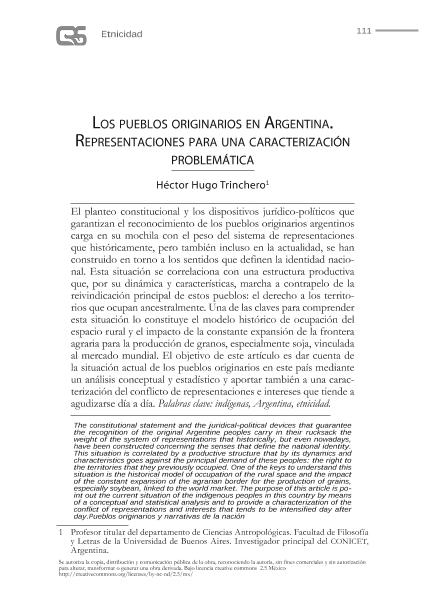Mostrar el registro sencillo del ítem
dc.contributor.author
Trinchero, Hector Hugo

dc.date.available
2023-03-03T18:34:12Z
dc.date.issued
2010-07
dc.identifier.citation
Trinchero, Hector Hugo; Los pueblos originarios en Argentina: representaciones para una caracterización problemática; Universidad Nacional Autónoma de México; Cultura y Representaciones Sociales; 4; 8; 7-2010; 111-139
dc.identifier.issn
2007-8110
dc.identifier.uri
http://hdl.handle.net/11336/189586
dc.description.abstract
El planteo constitucional y los dispositivos jurídico-políticos que garantizan el reconocimiento de los pueblos originarios argentinos carga en su mochila con el peso del sistema de representaciones que históricamente, pero también incluso en la actualidad, se han construido en torno a los sentidos que definen la identidad nacional. Esta situación se correlaciona con una estructura productiva que, por su dinámica y características, marcha a contrapelo de la reivindicación principal de estos pueblos: el derecho a los territorios que ocupan ancestralmente. Una de las claves para comprender esta situación lo constituye el modelo histórico de ocupación del espacio rural y el impacto de la constante expansión de la frontera agraria para la producción de granos, especialmente soja, vinculada al mercado mundial. El objetivo de este artículo es dar cuenta de la situación actual de los pueblos originarios en este país mediante un análisis conceptual y estadístico y aportar también a una caracterización del conflicto de representaciones e intereses que tiende a agudizarse día a día.
dc.description.abstract
The constitutional statement and the juridical-political devices that guarantee the recognition of the original Argentine peoples carry in their rucksack the weight of the system of representations that historically, but even nowadays, have been constructed concerning the senses that define the national identity. This situation is correlated by a productive structure that by its dynamics and characteristics goes against the principal demand of these peoples: the right to the territories that they previously occupied. One of the keys to understand this situation is the historical model of occupation of the rural space and the impact of the constant expansion of the agrarian border for the production of grains, especially soybean, linked to the world market. The purpose of this article is point out the current situation of the indigenous peoples in this country by means of a conceptual and statistical analysis and to provide a characterization of the conflict of representations and interests that tends to be intensified day after day.
dc.format
application/pdf
dc.language.iso
spa
dc.publisher
Universidad Nacional Autónoma de México

dc.rights
info:eu-repo/semantics/openAccess
dc.rights.uri
https://creativecommons.org/licenses/by-nc-nd/2.5/ar/
dc.subject
ARGENTINA
dc.subject
PUEBLOS ORIGINARIOS
dc.subject
REPRESENTACIONES SOCIALES
dc.subject
ESTADO-NACION
dc.subject.classification
Otras Humanidades

dc.subject.classification
Otras Humanidades

dc.subject.classification
HUMANIDADES

dc.title
Los pueblos originarios en Argentina: representaciones para una caracterización problemática
dc.type
info:eu-repo/semantics/article
dc.type
info:ar-repo/semantics/artículo
dc.type
info:eu-repo/semantics/publishedVersion
dc.date.updated
2023-03-02T15:23:11Z
dc.journal.volume
4
dc.journal.number
8
dc.journal.pagination
111-139
dc.journal.pais
México

dc.journal.ciudad
Ciudad de México
dc.description.fil
Fil: Trinchero, Hector Hugo. Consejo Nacional de Investigaciones Científicas y Técnicas; Argentina. Universidad de Buenos Aires. Facultad de Filosofía y Letras; Argentina
dc.journal.title
Cultura y Representaciones Sociales
dc.relation.alternativeid
info:eu-repo/semantics/altIdentifier/url/https://www.scielo.org.mx/scielo.php?pid=S2007-81102010000100111&script=sci_abstract
Archivos asociados
